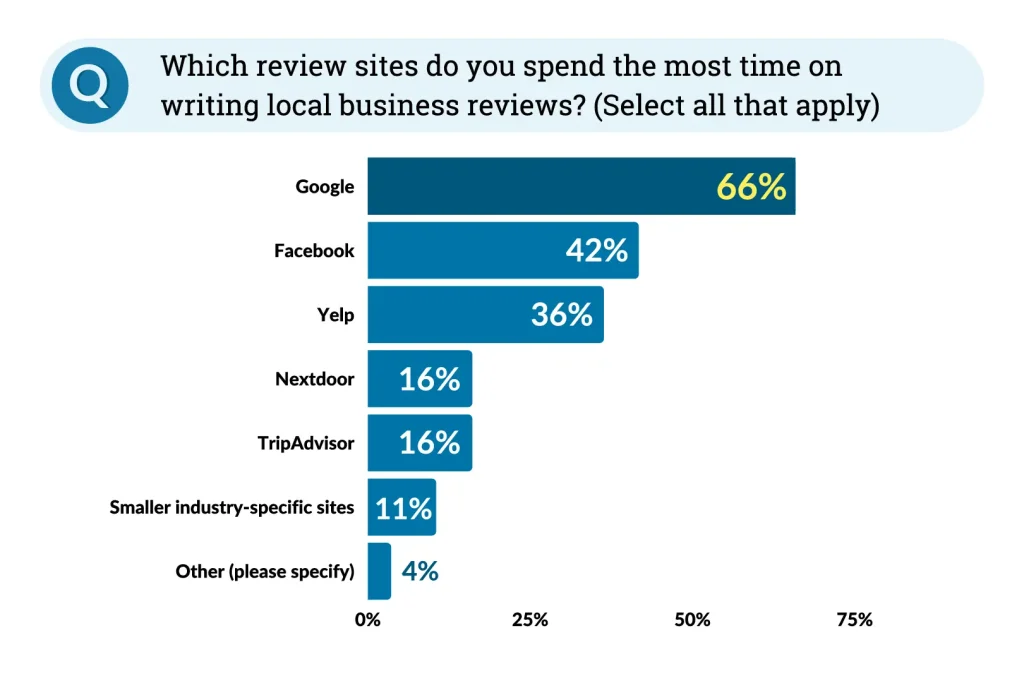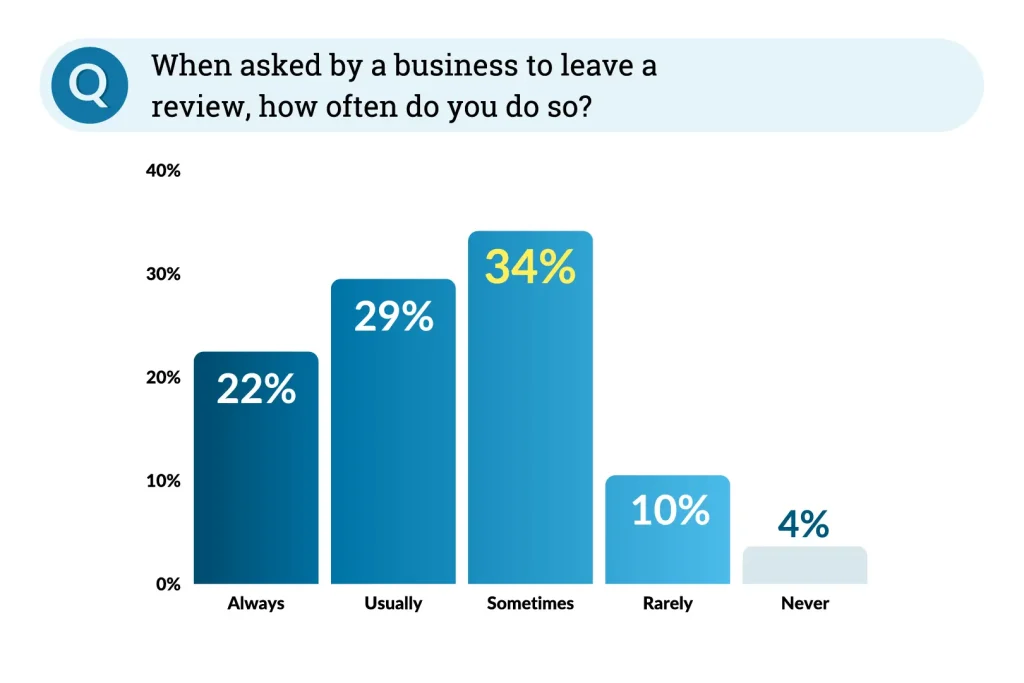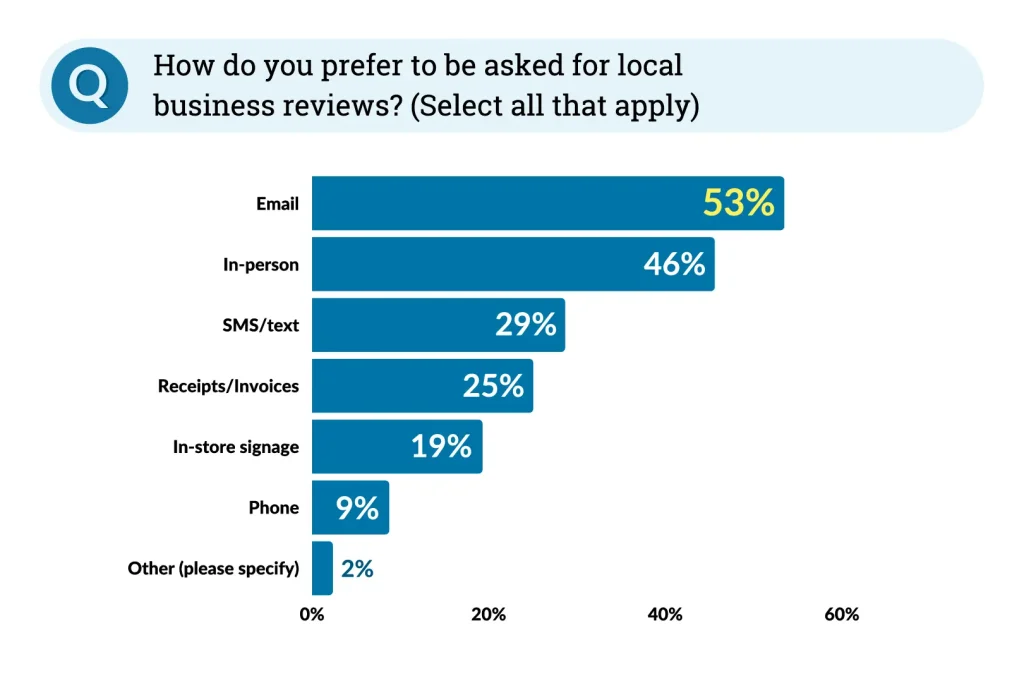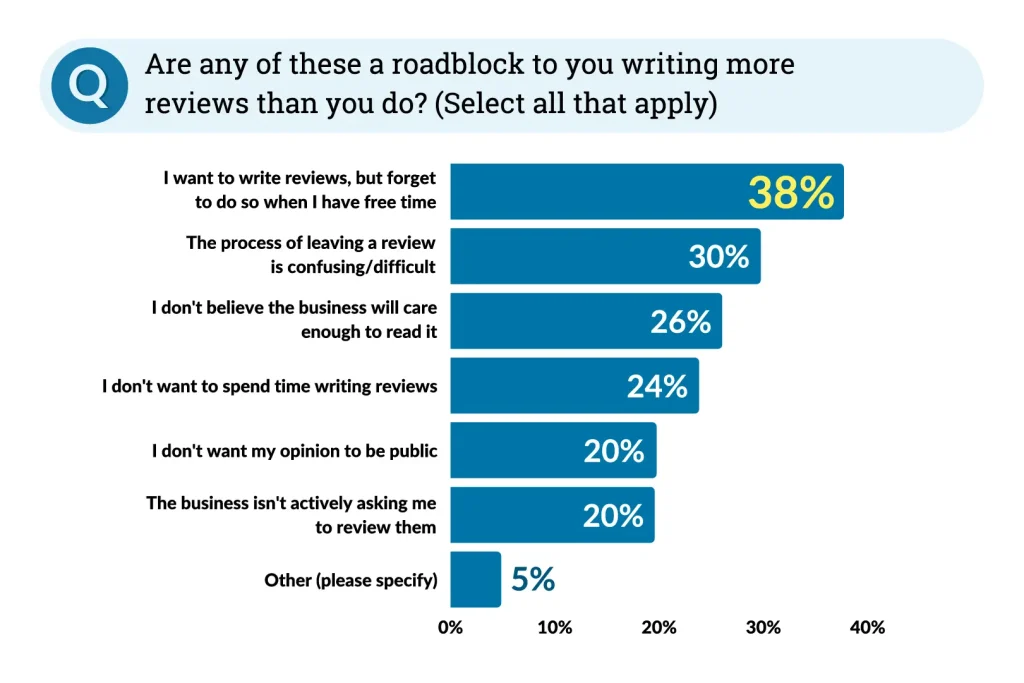What are the most common behaviors of those who write reviews online?
Local businesses can create a smart strategy to get not only positive reviews but also enough reviews to make a difference by understanding the behaviors and preferences of the users who write them. For the business to know how often its customers write reviews, where they write them, how they like to be asked to leave a review, the incentives they can get to share their experiences with the public, the causes of complaints and other factors, helps create a clear picture of the most valuable users for any business. Those who write reviews!
How often do you write online customer reviews for local businesses?
Understand how often customers leave reviews for businesses so you can devise an effective strategy.
Only 14% of respondents never write reviews, so keep asking!
Earlier, we saw that almost ⅓ of customers are suspicious of a business that has very few reviews compared to its competitors. The good news is that the 86% of respondents writes from many to some reviews, which means you can get enough reviews if you just keep asking and improve the way you ask to motivate more customers.
A small number of consumers (11%) are willing to write reviews daily, one (15%) does it every week and one (15%) does it every month. This total of 41% illustrates a highly active segment of the public that frequently reviews businesses. However, don't overlook the potential for less engaged customers who write reviews multiple times a year (17%) and those who write reviews only a few times a year (27%). This is more than a quarter of your customer base that could be motivated to leave a review of your business.
Where do you spend most of your time writing reviews of local businesses?
It is necessary to know which review platform users prefer most. This will allow you to identify exactly where your target audience is located and devise your strategy.

66% of customers spend the most time writing on Google
When asked to describe which platforms they spend the most time writing reviews on:
- The 66% told Google
- The 42% on Facebook
- The 36% on Yelp,
- Nextdoor and TripAdvisor were almost equal at 16% approximately
- 10% selected smaller, industry-specific sites
- 4% chose "other", citing platforms such as the companies' own websites, Amazon, Expedia, AirBnB, Etsy, Booking.com, Open Table, Trust Pilot and BBB.
The variety of platforms on which clients operate is wide, but what catches our attention is that Google attracts more than 60% of the reviews. More than all other platforms combined! A business can interpret this data in at least two ways.
- The business may decide that Google's prominence means that most of the work has been done. Users already use Google heavily, so that's where they will leave their criticism. Because of this, a business might choose to devote fewer resources to soliciting Google-based reviews and try to stand out on platforms where users spend less time. Like TripAdvisor - considering that effort in these areas could have a competitive advantage.
- The company might realize that Google's dominance requires focusing most of its review acquisition activities on it, and coupled with the statistic that 79% of review readers also spend most of their time there, this conclusion is certainly correct.
However, do not overlook the proportion of respondents (11%) who reported leaving reviews directly on local business websites. As we saw earlier, 33% of consumers cite reviews as the most important factor in determining whether they can trust a business and 68% say they trust what customers say about businesses more than what businesses say about themselves.
Of course, on the local SEO side, it is clear that reviews are the second strongest ranking factor after the optimization of Google My Business. So that's where giving priority to Google reviews is a one-way street. Because reviews alone cannot help you if the business is not visible in online user searches.
Select all of the following that made you leave a negative review:
If you understand beforehand the reasons why customers leave negative reviews, you have a good chance of avoiding them.
The main cause of negative reviews is poor or rude customer service
According to the survey respondents, the 65% of the negative reviews came from poor or rude customer service. This statistic is a great reminder of how important it is to treat every customer that you and/or staff who interact with customers as a source of a potential online review. The better your customers are treated, the more likely your business is to receive positive reviews. To the best of your ability as a business owner or leader, work to ensure that your customer-facing employees have what they need to meet or adequately respond to customer needs at all times, and when you feel you've had a positive interaction, don't hesitate to ask for a review! Remember that 86% of customers would leave a review if asked.
Other factors that cause customers to write a negative review include:
- Bad product (63%)
- Working in a poor working environment (38%)
- False information in listing or reviews of local business (29%)
- Failure of the company to resolve personal complaints (28%)
- Inadequate security protocols (28%)
- Incorrect information on the internet about physical addresses, telephone numbers and opening hours (23%)
- Having a negative opinion after previously working in the company (11%)
There is so much to mention here in terms of solutions, such as:
- Google My Business listing management can make a significant contribution to reducing inaccurate online information about your business
- Training staff to recognise and resolve complaints in person is an essential safeguard of reputation
- Request removal of reviews from former employees - not allowed on major review platforms
Why do you write reviews of local businesses?
Businesses are better equipped to create fantastic experiences and inspire great reviews when they know what motivates customers to leave a review.
Gratitude and the need to share their experience drives the overwhelming majority of critics
The reviews can seem daunting for new local business owners. It can help to know that the majority of customers don't leave reviews out of a desire to punish or blame businesses, but to share their experience and help other users make the best decision for them That's what they want, after all. To have plenty of reviews of businesses so that they too can make the best decision for themselves. When asked to choose all the reasons why they write reviews, 73% cited the motivation of just wanting to let others know about their experience. An excellent 63% generously spends time writing reviews to show appreciation to local businesses - a very encouraging thought. An additional 12% engages in writing reviews because they simply enjoy creating content for local businesses.
We also need to look on the positive side at 38% writing reviews to let the business know that it needs to improve. Previous polls have shown that the majority of dissatisfied customers never speak up. Those who do take the time to do so are actually providing an essential service in terms of reporting problems that the business can solve once they become aware of them. Negative reviews are information gold that should be taken as a catalyst for making meaningful adjustments that will improve customer satisfaction. Note also that 21% of reviews say they write with a specific goal of getting a response from the business. To ignore them would be similar to walking right past a customer asking for help in your place of business.
Has a local business asked you for a reassessment in the last 5 years?
Knowing how actively business owners take advantage of the possibility to request a reassessment can provide useful information.

39% of those who left a review have not received a request for review in the last 5 years
Fortunately, most platforms have no problem with a customer reviewing their review and 61% of reviewers have received at least one request from a business to review a review they wrote sometime in the last 5 years. It's a number that says a lot about the volume of local businesses implementing review acquisition campaigns as part of their marketing strategies. However, as 39% of reviews have not received a single review request in the last half decade, it's clear that many local businesses have great room for improvement.
When a business asks you to leave a review, how often do you do it?
Calculate the chances of success of a campaign increase positive reviews, finding out how customers generally respond to such actions.

If asked, more than half of customers will always or usually write a review
When a business takes the time to ask its customers to write a review, the 22% will always do it and the 29% will usually do it. These are very encouraging statistics and combined with the 34% who will sometimes write reviews if asked, your chances of increasing your number of reviews are excellent (85%). This percentage is of course not always true, as not all business sectors are the same in terms of the ease with which reviews can be requested and received. Catering businesses, hotels and service businesses are some of the industries for which it has been found that there is a high customer response to review requests.
Meanwhile, the 11% of consumers rarely accepts to leave criticism and the 4% never does. Local businesses in highly competitive markets may need to study this reluctant group of 15% more closely. It's just human nature for some people to ignore requests to review a business or is it the way they are asked that makes them unresponsive; Knowing how the public prefers to be asked could help you in this task and this brings us to the next question in our research.
How do you prefer to be asked for reviews from local businesses?
Increase the success rate of review campaigns by honoring customer preferences.

Email is the preferred method of requesting a review for more than half of consumers
And again before us the email marketing services, our favorite tool as email marketing strategist. 54% of consumers still cite it as their preferred means of receiving check requests. Following right behind email, requesting in person is the second most popular and preferred by 45% of customers, showing that interpersonal interactions are still key. Here a key element is to make it very easy for the customer to leave you a review. Plus you can very easily ask them to scan a QR code which will redirect them directly to the business review page. Also, an additional 9% cites phone conversations with the business as a means by which they like to be asked for reviews. We can think of all three as established, traditional ways of communicating.

However, businesses should embrace more modern methods that go beyond the traditional ones mentioned above to increase customer reviews via SMS/text messages, which 29% of consumers now prefer to receive review questions. The good thing about messaging is that the customer can, with one click, leave you a review on the same device on which the message was received. A sample form can be seen below:
Finally, longitudinal print media should be part of any integrated strategy for acquiring critics. QR codes on printed receipts and invoices receive a positive response from a significant 25% of customers and a further 19% are receptive to an in-store QR code. Think about how your windows, walls, shop fronts, takeaway bags, menus, packaging and receipts could ask customers to leave you a review. Next, we'll look at why the latter can make a difference.
What's stopping you from writing more reviews than you're already writing?

The main reason customers don't rate your business is because they forget
So here we will see why what we mentioned above can make a difference. Receipts, packaging, bags and other reminders for your customers to leave a review of your business take on a whole new dimension when you consider that 38% of consumers say the main reason they don't write more reviews is because they forget to do it when they have free time. We all know that life is busy and in this context, thoughtful reminders of assessment requests can help your customers without being a hassle.
Other barriers to submitting a review that consumers report are that the review process is too confusing or difficult (30%), they don't think the business cares enough to read what they write (26%), they don't want to spend time writing reviews (24%) , they don't want to submit their review publicly (20%) and finally they are not directly asked to leave a review (19%). Respondents who chose the "other" response option (5%) provided some enlightening comments, such as:
- They do not trust the reliability of specific rating platforms
- They only leave reviews for exceptionally good or bad experiences
- Fear of reprisals from the company or others
- They are very busy
- They want to keep the best local businesses secret
- They don't like to be asked for criticism
A well-planned marketing strategy can address so many of these obstacles. In addition to providing reminders, a business can, for example, streamline the review submission process by including links that can make submitting a review very easy. A business can convince hesitant customers to believe they are reading every review that appears by replying to all of them through the owner reply feature. And, of course, almost any business can simply ask for reviews!
This is where businesses can even give the customer an incentive to leave the review. This will show that you really appreciate their time. But there is a catch here! You can't ask them to leave only Positive review with some monetary consideration or other incentive. The motivation for the request for the review should be a single one, whether it is a positive or negative review. Doing so will build trust in your brand (it would hurt too badly if the customer felt that you were buying their positive review and they would think that this is how you have earned all the other positive reviews) but it is also against the terms of use of many review platforms.
Third finding: The power of responses to Google reviews.
Source: Moz



